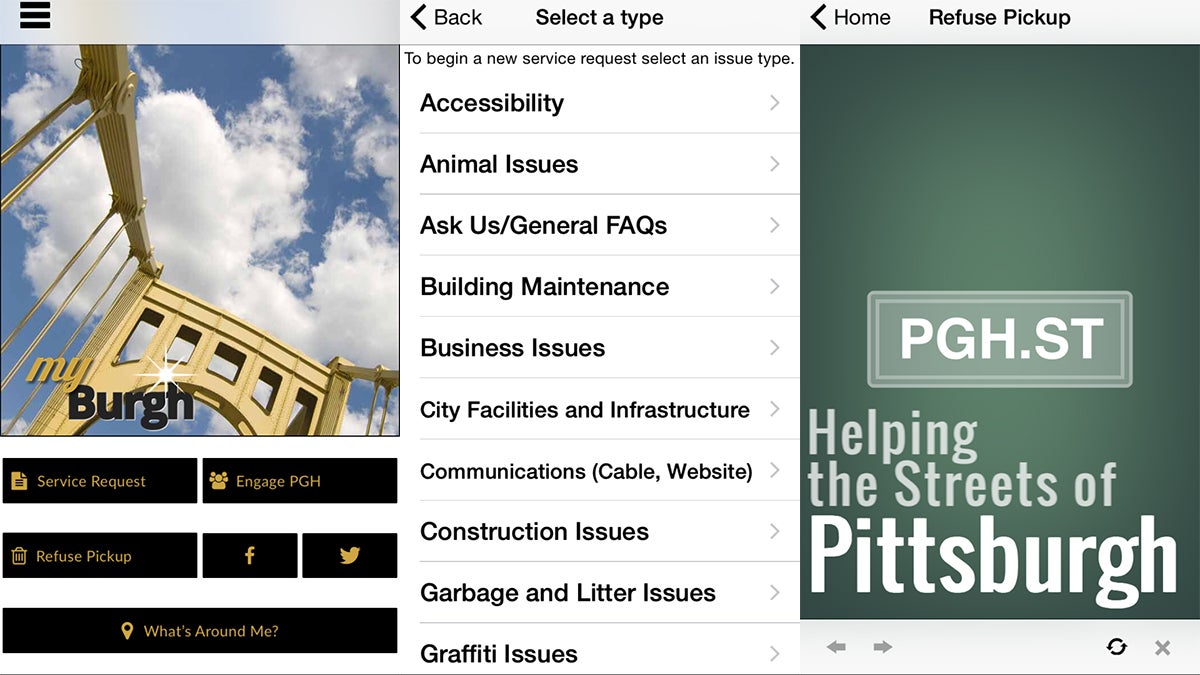Ideas Worth Stealing: Civic apps to inform citizens, provide access to government

The myBurgh app lets users request service, check the trash and recycling schedule for their block, or just ask a question.
Civic apps can connect citizens to their local government or make it easier to influence their leaders’ work.
Ideas Worth Stealing: Every week, Keystone Crossroads will look to cities across the world for lessons in urbanism and municipal governance that could benefit Pennsylvania. No city does it all right, and we hope these examples from metropolises near and far inspire and encourage cities here to think outside the box.
Slowly but surely, local governments are catching up with the private sector and harnessing the power of the smartphone to connect with citizens. Apps are popping up that make city living easier, better. But ‘civic app’ can mean so many different things.
Forest Gregg has a nice breakdown at DataMade:
…we can begin to identify four major intentions of civic apps: to inform, to persuade, to provide access, or to change the way our democracy works. These correspond to four genres of apps: news, propaganda, access, and system plumbing.
Civic apps either promote communication or action. Additionally, civic apps are either “ends” or “means” apps. For “ends” apps, people using the app is the point. In “means” apps, people using the app is good if it helps achieve some other end.
What does that translate to?
For example, Philadelphia and Pittsburgh have apps to complement their 311 activities — where citizens can submit complaints, like pointing out potholes to fix, or ask questions about government services.
Some apps are more focused on introducing efficiencies. On Thursday, Philadelphia launched a pilot app that will allow drivers to pay for parking from their phone, without having to feed the machine on the street. Pittsburgh rolled out a similar app just a few weeks ago.
But as cities commit more to open data — especially larger cities like Pittsburgh and Philadelphia — there are opportunities to create more useful apps. And the cities don’t necessarily have to do it themselves.
The Google Places API Developer Challenge pushes developers to build apps to address issues in their own communities. Winning apps include one by a Brazilian developer that helps users plan safe routes during flooding, and a runner-up out of Philadelphia that maps vacant lots around the city and crowdsources ideas for how to return the parcels to productive use.
Code for America sends tech-types to a handful of cities every year — Philadelphia and Pittsburgh have both hosted fellows — to improve city services by developing open-source technology. Sometimes that can include apps.
There are also locally bred efforts. The Philly Codefest and the Steel City Codefest in Pittsburgh bring together civilian hackers, developers, and tinkerers to work on solutions to local problems and build apps. West Homestead, Pa., just outside of Pittsburgh, worked with a graduate-level class at the University of Pittsburgh to develop a local 311 app.
Many of these apps are open source — which means the code, design and license are free and accessible to all — so cities with limited technology resources can make their own apps as long as they have the necessary data.
So what kind of civic apps would you want to see in your city? Maybe it’s an app worth stealing from another city, or maybe it’s something you haven’t seen at all. We’d love to hear your ideas. Comment below or email us at crossroads@whyy.org.
WHYY is your source for fact-based, in-depth journalism and information. As a nonprofit organization, we rely on financial support from readers like you. Please give today.


